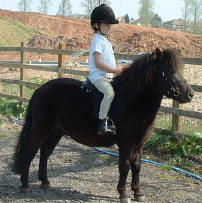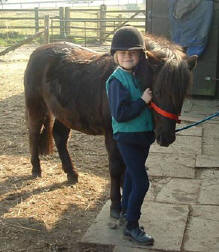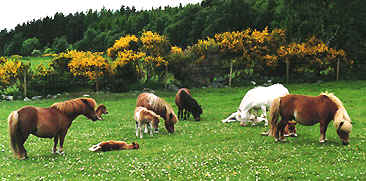|
|
So You Want to Buy a Shetland Pony ! Well, they are irresistible! Several things ought to be considered first, not only for the welfare of the pony, but also for your own good. Shetlands have a lot of character and may end up as misunderstood hooligans.
First of all,
they are real horses, very small ones, but nevertheless, should
be
treated as horses. |
||
|
The first things to consider are those that will affect the pony's well being. A Shetland pony will require a paddock that is large enough to provide most of its nourishment and most of its exercise. It must be well fenced, remembering that a small pony may go under or through a fence that is adequate for a larger pony. Electric fencing works well as an interior fence if you want to divide a paddock into smaller sections, which may be essential in summer to prevent laminitis, a condition that affects many horses and ponies on too rich a diet. It is important to ensure that there are no poisonous plants such as ragwort in or near the paddock where a pony could nibble them. A good clean supply of water is essential. Some ponies will also appreciate a mineral block to supply minerals that may be lacking in the grazing. Although a stable is not necessary for a Shetland, some shelter may have to be provided in winter where there is no natural shelter. A headcollar of suitable size will be necessary with a lead rope. The best headcollars are fully adjustable at the nose, throat and over the head and have proper buckles. It is worth spending a bit more for one of these as they will last longer if you are buying a growing youngster. The nose piece should be loose enough to allow free movement of the jaws but tight enough to prevent the nose band coming off over the nose or a hoof getting stuck when the pony scratches its nose. Some people leave a headcollar on their pony when it is in the field but remember that this may make it easier for someone else to catch the pony and remove it from the field without your knowledge. Where there is a reasonable supply of grass, good quality hay may be the only extra food required by an adult Shetland in winter. A foal will probably require a small quantity of hard feed in addition to ad lib hay during its first winter. Many Shetlands live until they are over 20 years of age. The older pony may need extra rations in winter to maintain good condition. Shetlands are very hardy and seldom become ill, but they need regular worming, at least every six months, and hoof care as with all equines. Ponies may have to be be treated for lice, particularly if they start rubbing their coats. Vets will happily advise on treatment for worms and lice. Healthy Shetlands are alert with bright clear eyes and have a reasonable covering over the ribs throughout the year. In winter, they will have a long thick coat but in the the summer, the coat is short and smooth with a shine to it. Having considered the pony's welfare, you can now decide the role of your Shetland. Are you looking for a pet, a child's riding pony or driving pony? Do you want to breed Shetlands? All these thing will influence your choice of pony and help you to decide whether you want a male or female and what size of pony you require. Whatever your ideal Shetland will be, it is a good idea to visit as many breeders as possible, who may have something suitable. This will give you an idea of the many different colours, the types available and average prices, before you decide on the pony of your choice. Reputable breeders will be happy to help with any queries or problems a new owner may have. If you consider buying a colt, which may seem a cheap option, do contact your vet first to find out the cost of castration. Although it may appear to be unnecessary to castrate such a small creature, it is essential if the pony is to remain a gentle, friendly part of the family. Sadly, many owners have discarded colts when they become frustrated, dominant stallions, which cannot share a paddock with another pony. These unfortunate Shetlands are unlikely to have a happy future. It is important to build up a relationship with your pony so the pony can be easily handled. This is done through regular contact, grooming all over, picking up the feet and leading the pony out for walks, which your Shetland pony will thoroughly enjoy. All these things prepare the pony for visits by the farrier or vet. It will be tempting to feed titbits, such as bread or carrots, but this is a mistake, especially with a young pony, as he will soon start looking for more when your supply has run out. The pony may become more persistent in his demands and give a sharp nip to draw attention, making him a danger to children particularly. Any treats should be given in a bucket or bowl but your pony will respond just as well to grooming and stroking without the bribes. Nipping must be discouraged. A quick tap on the nose and "No", will tell the pony that you do not appreciate his behaviour. Shetland foals have very dense coats to protect them in the worst weather. However, this coat can become very wet in winter and foals will appreciate somewhere dry to lie down, even if it is an open shed. The long, thick coat may become very matted in the spring when it starts to shed, so it is helpful to try to brush it out. A steel toothed dog brush is a useful accessory. Your Shetland will soon learn to trust you and will do whatever you ask of him. If you want to break him for riding or driving, follow the same routine as you would for a larger pony and he will learn very quickly.
Here are some things that other people have said about their ponies. " One of my best ponies was a Shetland - absolutely brilliant pony. I bought her on impulse at a sale when she was 21. She was lovely even for an adult to ride and lived till she was 35 years old." From Kate. ****** "The whole village loves him. He's just got a little girl riding - it's wonderful." From Judy ****** "I never really thought of buying a Shetland before as they always seemed too much of a pain. Since buying Kosha for Hannah 2 years ago, my opinion has changed completely. I am a total convert and just had to tell you Shetlands are by far the most loyal breed I have come across and if they are all as wonderful as Kosha, the breed will last forever." From Mandi ******
Go on; now start your search for your dream Shetland! When you have found your ideal pony, I hope you have many happy years together, but BEWARE, as the saying goes, one thing leads to another. You may find this applies to Shetland ponies!
|
|||
|
These pages
were compiled by Beth Mead of the Kellas Shetland Pony Stud. If you have enjoyed them, Top 2 photos are Copyright of Mrs. Mandi Griffiths
|
|||




